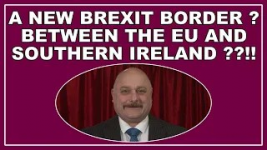Brussels says plan to extend Brexit grace period breaks international law
It's the EU which has been breaking international law (as it has done many times), not Britain...
Top legal opinion: It’s the EU which has broken international law, not the UK
For months the EU has been in material breach of its obligations under the Withdrawal Treaty
© Brexit Facts4EU.Org 2020
The EU pays scant regard to its own laws, let alone its international obligations
Facts4EU reveals the top legal advice which the UK Government has ignored
From the Editor
The following Brexit Facts4EU.Org article and report is important. The Government's actions this week have seriously damaged the reputation of the United Kingdom - at home and internationally. It is of course unsurprising that the EU have immediately started exploiting this for their own purposes. More worrying are the statements from further afield, including those from senior members of the US Congress.
The Government's handling of this is catastrophic and must be addressed urgently
It is essential - in our view and that of other serious Brexit organisations - that the Government now listen to the legal advice which they have had for months. They must immediately explain that action is being taken because the EU is in serious and material default of its obligations under the Withdrawal Treaty. It is the EU which is in breach, not the United Kingdom.
We are aware of meetings which will take place in Westminster in the coming days. We urge all MPs, and the Government, to consider the facts and the arguments carefully. An urgent and substantial refinement of the Government's message is required forthwith. We propose the following:
"The EU has been in default of its obligations under the Withdrawal Treaty since it was signed and has in effect broken international law.
"The UK Government is left with no choice but to repudiate the Withdrawal Treaty and pass legislation to mitigate the effect of the EU's breaches, for the sake of the citizens of the UK and the EU27, and to uphold the principles of international law."
On Tuesday in Parliament, during a debate on an urgent question, a Government Minister who voted Remain in the EU Referendum made an extraordinary statement.
Q: Sir Robert Neill MP (Bromley and Chislehurst, Conservative)
“…will he assure us that nothing that is proposed in this legislation does, or potentially might, breach international legal obligations or international legal arrangements that we have entered into?”
A: The Secretary of State for Northern Ireland (Rt Hon Brandon Lewis MP)
“I would say to my hon. Friend that
yes, this does break international law in a very specific and limited way. We are taking the power to disapply the EU law concept of direct effect, required by article 4, in certain very tightly defined circumstances. There are clear precedents of this for the UK and, indeed, other countries needing to consider their international obligations as circumstances change. I say to hon. Members here, many of whom would have been in this House when we passed the Finance Act 2013, that that Act contains an example of treaty override. It contains provisions that expressly disapply international tax treaties to the extent that these conflict with the general anti-abuse rule…”
Hansard, 08 Sept 2020, Volume 679
BREXIT FACTS4EU.ORG SUMMARY
Legal arguments showing how the EU has broken its own treaty with the UK
- Essential condition of participating in Withdrawal Agreement (WA) : to secure a free trade agreement (FTA)
- The EU has been acting in breach of a material term of the WA by denying the UK an FTA
- The EU has attempted to impose wholly unreasonable restrictions on the UK which no other country would accept
- The treaty was therefore entered into by the UK on a false premise from the EU
- The EU has breached its legal obligation to act in good faith
- The WA breaks the terms of the Good Friday Agreement
- The WA is in breach of the ECHR principle of the right to vote
- The WA is in breach of the UN Charter's principle of “self-determination”, its most important tenet
- The UK Government must now pass an Act of Parliament superseding and revoking the WA
It’s the EU which has already breached the terms of the Withdrawal Treaty
On 18 July 2020 Brexit Facts4EU.Org reviewed and published the legal arguments contained in a 102-page paper which was presented to Government. The arguments were written by some of the country’s top lawyers experienced in these matters, such as Martin Howe QC, Chairman of Lawyers for Britain, and Barnabas Reynolds, a Partner at Shearman and Sterling, amongst other experienced lawyers in EU matters.
Their conclusions were stark.
- The UK as a state retains its sovereign right to withdrawal from the EU, which is an international organisation
- When the UK exercised its right to leave, it participated in the WA process on the basis of an essential condition: agreement on a future permanent arrangement with the EU that enshrines UK sovereignty and secures an FTA
- The Protocol and other aspects of the WA are incompatible with the agreement intended for the end of 2020
- The EU has been acting in breach of a material term of the WA, meaning that the treaty was entered into on a false premise
- The Protocol is in breach of the ECHR principle of the right to vote
- The UK must exercise its right to suspend and terminate the WA obligations
- The UK must subsequently pass an Act of Parliament superseding the WA, in line with Parliamentary Sovereignty under Section 38 of the Withdrawal Agreement Act 2020
The full legal argument for tearing up the WA and PD
The detail of the legal arguments are best read in full in
the CBP paper [PDF], starting on page 68. Of necessity this Brexit Facts4EU.Org article can only present a summary together with key points from the document.
Right: Barnabas Reynolds, Partner at Shearman and Sterling, and one of the report's authors
Below we present key excerpts from the report
“As can be seen, the key elements of the Withdrawal Agreement including the Northern Ireland Protocol are incompatible with UK sovereignty if continued into the future and should operate merely as a steppingstone to an end of year long-term relationship between the UK and the EU.
“The EU has seriously breached the agreement, even as it stands, since it has been structurally unable to engage in meaningful negotiations (for what is now the majority of the intended negotiation period) towards a sovereign outcome for the UK.
“The UK therefore needs to prevail on the EU to agree to remove the sovereignty-incompliant elements of the WA and the Protocol or be ready to repudiate the arrangement.”
If the EU refuses a mutually beneficial future arrangement, then the UK should:
- Treat the Withdrawal Agreement and Protocol as no longer having any legal force
- Implement Alternative Arrangements for the North-South border on the Island of Ireland, indicating to the EU that the Government is prepared to negotiate Mutual Enforcement instead, if preferred, from the end of 2020
- Cease to make payments to the EU under its provisions
- Treat EU citizens resident in the UK unilaterally in a manner consistent with the UK’s legal framework
It should be noted that since the above report was written the EU has continued to act in bad faith. It is our understanding that the report's authors now see little alternative but to move to revoke the Withdrawal Treaty unless there is a very rapid and fundamental shift in EU policy.
For months the EU has been in material breach of its obligations under the Withdrawal Treaty

facts4eu.org


 www.euractiv.com
www.euractiv.com






